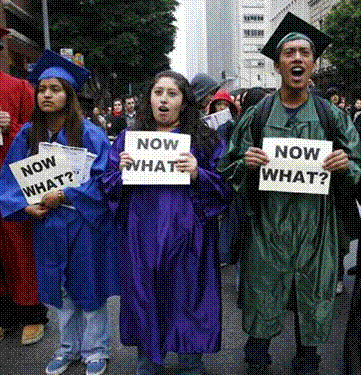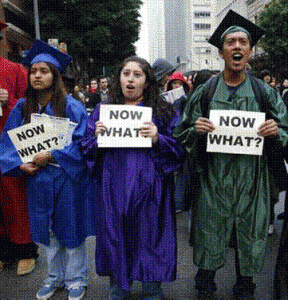Dispatches from an Immigration Front Line – by Pamela K. Brubaker
He has told you, O mortal, what is good; and what does the Lord require of you but to do justice, and to love kindness, and to walk humbly with your God? Micah 6: 8 NRSV
After the reading of the text from Micah, S walked to the pulpit dressed in the cap and gown from his graduation last May. He had come to deliver the homily during the weekly chapel service at his alma mater, California Lutheran University (CLU). S told us that he was undocumented, something he had been afraid to make known during his four years at the University. He spoke poignantly about his journey to become the first in his family to graduate not just from college, but high school, middle school, and elementary school. His mother brought him to the US from Mexico when he was just a year and a half. “I am an American,” he asserted. This is the only country I have known, but I am proud of my identity. I do not want your pity, I want justice.
S talked about how important the church had been in his life – Bible school, camp, youth group. As a child he was too frightened to go to school because of anti-immigrant hysteria, but he returned after the “white” pastor’s wife told him that they would not let anything happen to him. Several of the church members were in chapel that day, to support him as they have throughout the years – a powerful spiritual presence.
Dreamers without Borders/Sonadores Sin Fronteras
S is part of the “Dreamers without Borders/Sonadores Sin Fronteras” movement, young people like himself who are speaking out in California and across the country, lobbying public officials at the state level and in DC to pass the DREAM Act. Development, Relief and Education for Alien Minors (DREAM), first introduced in 2001, would provide conditional permanent residency (a “green card”) to certain undocumented students who graduate from US high schools, are of “good moral character,” arrived in the U.S. before age 16, and have been in the country continuously for at least five years prior to the bill’s enactment. If they complete two years in the military or two years at a four year institution of higher learning, the students would obtain temporary residency for a six year period – a path to citizenship.
There are currently around fifty undocumented students at our University, most of whom are not “out.” They are welcomed by Admissions staff and have access to private scholarships, in keeping with our mission as a university of the church. But when they graduate, they still cannot legally drive or work unless current policies change. Ironically for S, the CLU Alumni Association gives all graduates a CLU Alumni license plate holder. He showed us his, along with a photo of his deceased father, a Vietnam veteran, and an American flag. “Dreamers without Borders” provides information and support to undocumented high school and college students, along with its advocacy for the DREAM Act.
Clergy and Laity United for Economic Justice – working toward a Dream
In January, Rev. Alexia Salvatierra, ELCA pastor and Executive Director of Clergy and Laity United for Economic Justice of California, spoke at the weekly CLU chapel service.* She and CLUE-CA had just received the first CLU Peace Prize, which recognizes the contributions of an individual or organization in the region whose service to humanity builds the foundation for peace and justice in the world. Alexia spoke about the faith-based work of CLUE in coordinating the national New Sanctuary Movement, in which congregations support undocumented immigrants facing deportation. She told the story of Liliana, a wife and mother of young children from our County, who was threatened with deportation after she and her husband, a naturalized American citizen, tried to regularize her status.
When Immigration and Customs Enforcement (ICE) agents came to take her very early one morning in 2007, her daughter asked them why they were taking her mommy away. After a conversation with Liliana and her husband, Gerardo, the agents gave her a week to tell her children good-bye and make arrangements for their care. During this time Liliana realized that she couldn’t leave her children, who are American citizens, to live in Tijuana, nor could she and her husband take the family to Mexico where work is scarce. They began to look for a sanctuary.
The United Church of Christ in Simi Valley gave Liliana sanctuary, thinking it would be for six months or so. Instead they sheltered her for three years, with the support of her family, Ventura County CLUE, and its director Alice Linsmeier. During this time “Save Our State” (an anti-immigrant group) picketed the church and the city told them that they would have to pay thousands of dollars for police protection, but Liliana, the congregation, and CLUE reached out to defuse the conflict. CLUE also worked with ICE to change their deportation policy. The July 2010 policy memo upholds family unity and re-prioritizes deportations to focus on those accused of serious crimes. Liliana and two other sanctuary families have been granted deferred deportation based on this policy. Liliana has spoken to classes at CLU and speaks passionately about the strong faith that sustains her in this journey. (Liliana’s story is included in Neighbor: Christian Encounters with ‘Illegal” Immigration, by Ben Daniel.)
The Dreamers, the Sanctuary Movement, and CLUE all want and are working for just, comprehensive immigration reform. But they also walk with those who suffer from the current broken system. The DREAM Act will be introduced again in this year’s Congress, as it has every year since 2001. Last year it had bipartisan support and lost by just five votes. If you haven’t already, inform yourself and your congregation about this Act, join or organize faith-based advocacy groups, connect with denominational agencies working on immigration reform, lobby Congress and President Obama, who has pledged to pass the DREAM Act in 2011.
Called by God to serve one another
Graced by God to love one another
Loved by God to be agents of mercy and justice
Be at peace in the presence of God and care for all of God’s creation. Amen.
(Blessing from the April 13th CLU Chapel Service)
Rev. Salvatierra’s homily is available as a podcast at http://www.callutheran.edu/chapel


